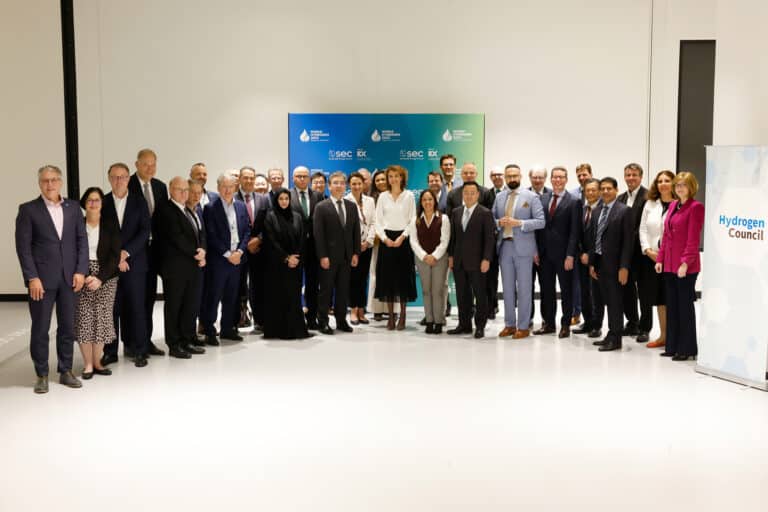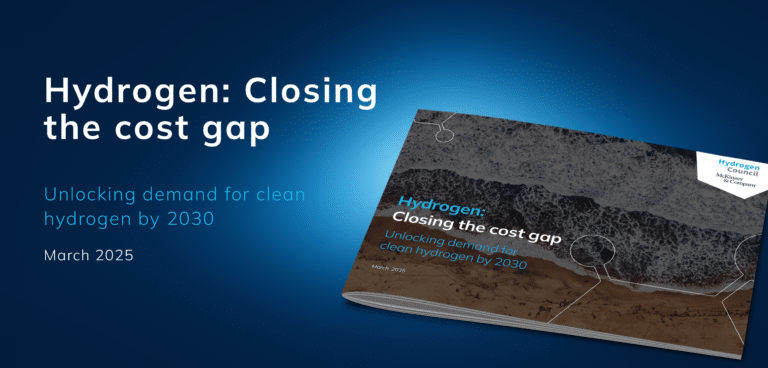TotalEnergies was one of 13 founding members of the Hydrogen Council when the global CEO-led initiative was created in 2017. What does it mean to TotalEnergies to be a founding member of the Council?
In January 2017, I was in Davos to launch the Hydrogen Council alongside 12 other business leaders. At that time, the Paris Agreement was two years old, and governments had not yet issued their hydrogen strategies. It was an ambitious undertaking that perfectly reflects TotalEnergies’ Pioneer Spirit.
As a founding member, TotalEnergies has a special duty and is fully committed to the Council’s success, from the boardroom to the field. We are responsible for maintaining that Davos momentum while integrating new members from diverse backgrounds who can enrich the Hydrogen Council’s vision and amplify its impact in the coming years.
Why did TotalEnergies want to be a part of the Hydrogen Council?
Hydrogen is important for TotalEnergies. We have long been a major producer and consumer of hydrogen in our Refining & Chemicals segment. Since 2002, we have been leading the way in hydrogen distribution for heavy terrestrial mobility in Germany. We are evaluating and maturing renewable and low-carbon hydrogen projects in key geographies.
We are convinced that renewable and low-carbon hydrogen will play a major role in the energy transition, in particular for the decarbonization of industry and transport and potentially in dispatchable sources of power.
So it is important for us to be part of a focused internationally recognized organization of stakeholders from different sectors and regions. We will leverage our experience in electrons and molecules to help the Hydrogen Council accelerate and advocate for the deployment and commercialization of industrial-scale hydrogen solutions worldwide.
Six years have passed since the Hydrogen Council launched and the organization has grown significantly in that time. What are some of the biggest milestones achieved so far?
The first thing the Hydrogen Council achieved was cooperation between members on key topics for the hydrogen economy, such as safety. We all must be exemplary in this area, and I thank the Hydrogen Council for its efforts.
For the past five years, the Council has also succeeded in establishing its credibility by publishing authoritative research. Hydrogen Insights has become a leading publication in the sector for its outlook on the hydrogen market and insight into the actions required to unlock hydrogen at scale.
Finally, the Council is progressively recognized as a key partner for policymakers, and I am grateful to Daryl Wilson and his team for their incredible work at the recent COP, explaining that there is no climate solution without clean hydrogen.
Where does TotalEnergies see the potential for hydrogen?
The hydrogen economy is not a simple economy; we are just at the beginning. It is important to understand demand in the hard-to-abate sectors and converge on a merit order of hydrogen end-uses.
It is clear, however, that hydrogen or its derivatives have great potential in various industrial applications either as feedstock/reactant or energy carrier, in long-distance road, sea or air transportation, and even flexible power generation that would complement the intermittent renewables.
Our TotalEnergies Energy Outlook highlights the potential we see for clean hydrogen on the road to 2050. But costs must come down and infrastructure must be built up to encourage the adoption of hydrogen and industrial scale-up.
With regards to hydrogen, what does TotalEnergies have planned for 2023?
2023 will be an exciting year for hydrogen and derivatives projects against the backdrop of major incentives in the USA and Europe.
In France, we target the FID of the 120 MW Masshylia electrolyzer project at La Mède Biorefinery, one of the two electrolyzer projects in France awarded within the framework of the second Important Project of Common European Interest (IPCEI) in the hydrogen value chain. It’s a concrete step in our plan to decarbonize the entire grey hydrogen consumption, 300 ktpa, in our European refineries by 2030, which calls for other projects like Masshylia.
We are actively originating and evaluating large-scale opportunities in the USA and other key geographies.
About The Hydrogen Council
The Hydrogen Council is a global CEO-led initiative that brings together leading companies with a united vision and long-term ambition for hydrogen to foster the clean energy transition. The Council believes that hydrogen has a key role to play in reaching our global decarbonization goals by helping to diversify energy sources worldwide, foster business and technological innovation as drivers for long-term economic growth, and decarbonize hard-to-abate sectors.
Using its global reach to promote collaboration between governments, industry and investors, the Council provides guidance on accelerating the deployment of hydrogen solutions around the world. It also acts as a business marketplace, bringing together a diverse group of 140+ companies based in 20+ countries across the entire hydrogen value chain, including large multinationals, innovative SMEs, and investors.
The Hydrogen Council also serves as a resource for safety standards and an interlocutor for the investment community, while identifying opportunities for regulatory advocacy in key geographies.
To find out more visit www.hydrogencouncil.com and follow us on Twitter @HydrogenCouncil and LinkedIn.
Joanna Sampson, Communications Manager, Hydrogen Council
joanna.sampson@hydrogencouncouncil.com



